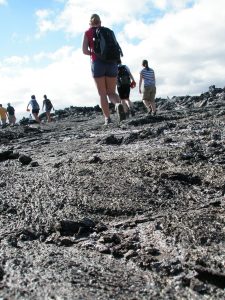Study Abroad in ES
Semester programs with which Lafayette is affiliated
Frontiers Abroad
 Frontiers Abroad offers two semesters in New Zealand and one summer in South Pacific Island study abroad programs for geology, earth system, and environmental science and engineering students. Both semester programs, Geology of New Zealand and New Zealand Earth Systems, combine a 5-week field camp with a campus semester at the University of Canterbury or the University of Auckland. The summer South Pacific Island Systems Program is a 6-8 week program based in the Cook Islands that focuses on marine and coastal management and ecology. The programs combine field-based education, inquiry-based learning, and research projects.
Frontiers Abroad offers two semesters in New Zealand and one summer in South Pacific Island study abroad programs for geology, earth system, and environmental science and engineering students. Both semester programs, Geology of New Zealand and New Zealand Earth Systems, combine a 5-week field camp with a campus semester at the University of Canterbury or the University of Auckland. The summer South Pacific Island Systems Program is a 6-8 week program based in the Cook Islands that focuses on marine and coastal management and ecology. The programs combine field-based education, inquiry-based learning, and research projects.
Frontiers Abroad website
Woods Hole Semester in Environmental Science
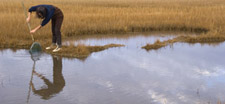 The Semester in Environmental Science is a 15-week fall semester at the Ecosystems Center of the Marine Biological Laboratory in Woods Hole, Massachusetts. The curriculum provides an intensive field and laboratory-based introduction to ecosystem science and the biogeochemistry of coastal forests, freshwater ponds, and estuaries. Scientists at the Ecosystems Center serve as faculty for the program. In addition to teaching fundamentals of ecosystems science, they discuss their current research which touches on important issues of global change. The curriculum leads students to develop research questions of their own. Equipped with new knowledge and techniques learned in the first weeks of the semester, they pursue independent research during the last six weeks of the program. SES students report their findings at a final symposium that is open to the entire Woods Hole scientific community, a world center for marine and environmental sciences.
The Semester in Environmental Science is a 15-week fall semester at the Ecosystems Center of the Marine Biological Laboratory in Woods Hole, Massachusetts. The curriculum provides an intensive field and laboratory-based introduction to ecosystem science and the biogeochemistry of coastal forests, freshwater ponds, and estuaries. Scientists at the Ecosystems Center serve as faculty for the program. In addition to teaching fundamentals of ecosystems science, they discuss their current research which touches on important issues of global change. The curriculum leads students to develop research questions of their own. Equipped with new knowledge and techniques learned in the first weeks of the semester, they pursue independent research during the last six weeks of the program. SES students report their findings at a final symposium that is open to the entire Woods Hole scientific community, a world center for marine and environmental sciences.
The Woods Hole Semester in Environmental Science satisfies all requirements for the Environmental Science minor at Lafayette.
Semester in Environmental Science website
DIS Copenhagen Semester
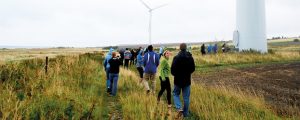 Sustainable development is one of the most important and hotly debated topics of the 21st century. In Denmark and Europe, strategizing sustainability initiatives is a priority from energy consumption to food production. Join the debate and discover the stakeholders shaping the agenda. Students will visit some of the world’s most progressive sustainability initiatives in Copenhagen, such as offshore windmill parks, district heating plants, and urban gardens as well as create their own strategic plan for a sustainable future by drawing on classroom experiences, Field Studies, and Study Tour visits.
Sustainable development is one of the most important and hotly debated topics of the 21st century. In Denmark and Europe, strategizing sustainability initiatives is a priority from energy consumption to food production. Join the debate and discover the stakeholders shaping the agenda. Students will visit some of the world’s most progressive sustainability initiatives in Copenhagen, such as offshore windmill parks, district heating plants, and urban gardens as well as create their own strategic plan for a sustainable future by drawing on classroom experiences, Field Studies, and Study Tour visits.
DIS Copenhagen website
IES Abroad
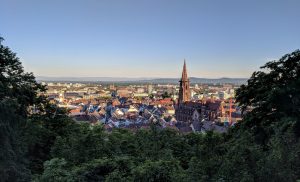 The Environmental Studies & Sustainability Program allows you to explore important topics in Environmental Studies in English, while living in Freiburg, a center of the modern environmental movement.
The Environmental Studies & Sustainability Program allows you to explore important topics in Environmental Studies in English, while living in Freiburg, a center of the modern environmental movement.
Organized in cooperation with the Forest Ecology and Management Program at the distinguished Albert-Ludwigs-Universität Frieburg, the program offers English-taught courses taken alongside German and international students. Courses are organized as a series of three-week modules that focus on the sustainable management of natural resources, with a special emphasis on the adaptive management of forests. Additional topics include ecological processes in ecosystems and human effects on the environment. Post-program research assistantships and extensive field study trips to the Swiss Alps, the Rhine River Valley, and the Black Forest give you hands-on experience.
IES Abroad website
SEA Semester
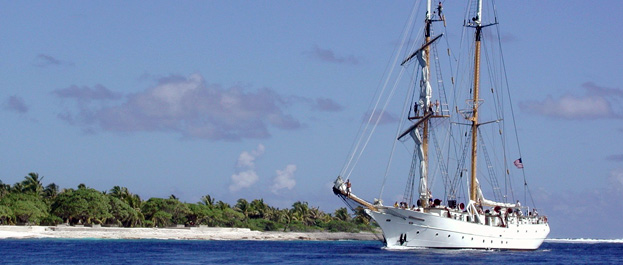 SEA Semester is a 12-week semester that takes place half on shore and half at sea. The interdisciplinary program begins in Woods Hole, MA, where students study the chemistry, biology, physics, and geology of the oceans and design research projects to carry out at sea. Class topics include: the history and culture of mariners, the major marine policy issues, and what it requires to take a vessel under sail safely to the deep ocean and to international ports.
SEA Semester is a 12-week semester that takes place half on shore and half at sea. The interdisciplinary program begins in Woods Hole, MA, where students study the chemistry, biology, physics, and geology of the oceans and design research projects to carry out at sea. Class topics include: the history and culture of mariners, the major marine policy issues, and what it requires to take a vessel under sail safely to the deep ocean and to international ports.
After six weeks on shore, students go out to sea on one of the program’s 135-foot vessels, either in the Atlantic/Caribbean or in the Pacific, and stand watch as part of the shipboard community of 35. Students participate in all of the duties the ship requires, including handling sail, navigating, and making sure all equipment stays in good working order. SEA offers several semesters with various themes, including Ocean Exploration, Documenting Change in the Caribbean, Oceans & Climate, Sustainability in Polynesian Island Cultures and Ecosystems, and Energy & the Ocean Environment, as well as a summer session.
SEA Semester website
Williams-Mystic
 During this 17-week semester based in Mystic, CT, students study the history, literature, policy and science of the sea. The Williams-Mystic curriculum is based on an interdisciplinary and multidisciplinary hands-on course of study focused on the world’s oceans and coastlines. Classrooms include Mystic Seaport’s G.W. Blunt White Library, home to one of the world’s most extensive collections of maritime volumes, periodicals and documents; a marine science teaching facility near the Mystic River; and, a large number of field sites around the region. The program also includes 10 days offshore on a tall ship, 10 days on the Pacific Coast, and a week exploring the Gulf Coast of Louisiana.
During this 17-week semester based in Mystic, CT, students study the history, literature, policy and science of the sea. The Williams-Mystic curriculum is based on an interdisciplinary and multidisciplinary hands-on course of study focused on the world’s oceans and coastlines. Classrooms include Mystic Seaport’s G.W. Blunt White Library, home to one of the world’s most extensive collections of maritime volumes, periodicals and documents; a marine science teaching facility near the Mystic River; and, a large number of field sites around the region. The program also includes 10 days offshore on a tall ship, 10 days on the Pacific Coast, and a week exploring the Gulf Coast of Louisiana.
Williams-Mystic website
Summer Ecosystem experiences for undergraduates
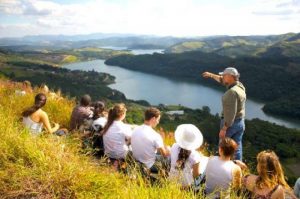
The SEE-U Program is a 5-week 6 credit summer environmental study abroad program in which students participate in a combination of lectures and labs, while conducting environmental fieldwork in unique natural settings around the world.
The Summer Ecosystem Experiences for Undergraduates (SEE-U) program provides undergraduate students of all majors with a global understanding of ecology and environmental sustainability. The SEE-U program gives you the opportunity to participate in a combination of lectures and labs, while conducting environmental fieldwork in unique natural settings around the world.
- Takes place in environmental hotspots or human impacted field sites.
- Earn 6 points of science credit from Columbia University in just 5 weeks.
- Designed for students of all majors. No prerequisites required to enroll.
- Special fellowship funding is available from EICES.
SIT Study Abroad

SIT offers semester and summer programs in Natural Resource Management, Biodiversity, and Environmental Policy. Students will learn how to collect, analyze, integrate, and report social and ecological data in selected ecosystems to understand and evaluate critical environmental issues related to the program theme. Students are expected to consider the cultural and political context of current environmental challenges, such as reforestation and erosion control in Madagascar; species diversity and commercialization of forest products in the Amazon; coral reef ecology and ecotourism on the Great Barrier Reef of Australia; or efforts to preserve forests in Tasmania. Programs also consider the transnational effects of environmental change, such as the international implications of Mount Kilimanjaro’s retreating glaciers, or the conflict between traditional values of land stewardship and global trade in Brazil.
SIT Study Abroad website
Center for International Programs

Universidad Veritas offers 12- week semesters or 5 week (summer) intensive elective courses in Environmental Sciences in Costa Rica. Students who don’t have an advance level of Spanish can enroll in courses taught in English.
Environmental Impact and Social Development course is an introduction to the study of major environmental problems and issues confronting modern society. Students will examine ecosystems, population patterns and dynamics; use and misuse of resources; population and environmental quality; environmental citizenship; and economic incentives and Costa Rican initiatives in eco- tourism.
Tropical Ecology course students will learn about the interactions between earth and land and how these interactions or processes affect our life and the stability of the planet. Emphasis will be given to the study of the most relevant tropical ecosystems such as: tropical rain forest, cloud forests, coral reefs, and mangroves. Field trips to selected environments will provide on site examples of some of the issues learned through class work and readings. All field trips are mandatory.
Land Vertebrates of Costa Rica course is an introduction to the zoology of terrestrial vertebrates in Costa Rica. Students will gain insight about various biological characteristics of the groups of land chordates in the country. Costa Rica has an immensely rich animal biodiversity, with an influence of both North American and South American fauna, and is a world-renowned hot spot for animal research and conservation.
Tropical Marine Biology course studies the balance between ecosystems and human stress and demands on the constant changing marine environment.
Climate Change and Renewable Energies in Costa Rica course is an introduction to renewable energies and their impact on development and future needs of planet Earth. Mankind is facing serious natural disasters and events caused by global warming and climate change. These phenomena are related to the population growth and the increase in fossil fuels burning, particularly after the industrial revolution. There is a general concern and interest of societies to change gradually toward the implementation of renewable energies to meet human needs in the future.
Environmental Awareness and Sustainable Development course is an introduction to the actual world problems in natural resources management and conservation, and its effects on sustainable development efforts in tropical countries. Current issues that condition the possibility for development such as poverty, global warming, deforestation, and potable water will be analyzed.
Universidad Veritas website
The School of Field Studies
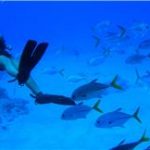
The School for Field Studies (SFS) semester and summer programs are high-quality interdisciplinary academic, undergraduate-level programs that are accredited by Boston University. SFS “classrooms” include coral reefs, rainforests, and African savannas. The focus of our research ranges from wildlife conservation to rainforest restoration.
Our semester study abroad and summer college study abroad programs are designed to teach students about critical local environmental problems and train them to do field research that will help address these problems. Our faculty provide core lectures needed to understand the content areas pertinent to case study and research questions. Field exercises complement classroom lectures and help students to develop skills needed for Directed Research projects.
The academic and research agenda at each center is driven by a Five Year Research Plan, established by SFS staff and local community leaders.
The School of Field Studies website
The Organization for Tropical Studies
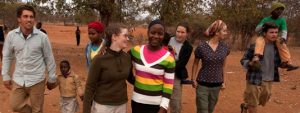 The Organization for Tropical Studies (OTS), in partnership with Duke University, proudly offers semester and summer programs for undergraduate students interested in field biology. Our Costa Rica Semester and Summer Programs utilize all three OTS field stations as well as other Costa Rican sites, allowing direct study of a wide range of tropical ecosystems and habitats. Our South Africa Semester Program is based at the world-renowned Kruger National Park, allowing direct study of African savanna ecosystems. All of our undergraduate offerings feature the OTS method of field-based, experiential learning under the close guidance of highly qualified Ph.D.-level professors. Graduates of an OTS undergraduate program will be well-prepared for advanced studies in tropical biology and resource management.
The Organization for Tropical Studies (OTS), in partnership with Duke University, proudly offers semester and summer programs for undergraduate students interested in field biology. Our Costa Rica Semester and Summer Programs utilize all three OTS field stations as well as other Costa Rican sites, allowing direct study of a wide range of tropical ecosystems and habitats. Our South Africa Semester Program is based at the world-renowned Kruger National Park, allowing direct study of African savanna ecosystems. All of our undergraduate offerings feature the OTS method of field-based, experiential learning under the close guidance of highly qualified Ph.D.-level professors. Graduates of an OTS undergraduate program will be well-prepared for advanced studies in tropical biology and resource management.
Organization for Tropical Studies website
Lafayette interim courses
Several Lafayette courses, held over the January interim, have environmental content, including INDS 127 (Envision Environmental Science: New Zealand), Geol 150 (Geologic Evolution of the Hawaiian Islands), and INDS 187 (Sustainable Approaches in the Developing World: Rural Honduras from the Mayans to Present). Geol 150 counts towards the Environmental Science minor.
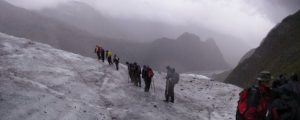
Students in INDS 127 hiking on Fox Glacier in January 2009.
INDS 127: Envision Environmental Science: New Zealand: College students traveling to New Zealand partner with home-based third and seventh grade students to explore various environmental science topics through an inquiry based, technology driven, and civically-minded program. The program is focused on arming students with academically sound tools that will prepare them to better understand our globally-connected environment, to prepare them to be better stewards of the environment, and to develop the necessary knowledge base to assess and respond to the impact of the global environmental issues that accompany a 21st century lifestyle. Highlights include two days on a Marae exploring the Maori culture and their role, past and present, in the evolution of New Zealand; swimming with Hector’s Dolphins (the world’s smallest dolphins) at Akaroa, a town that sits at the edge of a beautiful harbor inside the eroded crater of a huge extinct volcano; a hike on Fox Glacier; and, a safari by way of a jet boat on the Dart River.
Geol 150: Geologic Evolution of the Hawaiian Islands: This course provides students with an understanding of how volcanic, geomorphic, and coastal processes have shaped, and continue to shape, the Hawaiian Islands. The course focuses on volcanism, landform development, and coastal processes. The Hawaiian Islands provide a unique opportunity to study active volcanic processes building the islands in conjunction with geomorphic processes which alter the volcanic landscape. The Hawaiian landscape ranges in age from 25 million years to minutes old. Students have the unique opportunity to study the volcanic processes creating the islands and then see how the soils, landscapes, and coasts have evolved through time.
INDS 187: Sustainable Approaches in the Developing World: Rural Honduras from the Mayans to Present: An intensive study of how agricultural practices, ecology, and access to water are linked to sustainable development in rural Honduras. Students experience sustainable agriculture demonstration sites, the Mayan ruins at Copan, an ecotourism lodge within a national park, and three days in a rural village working with the indigenous Tolupan in cooperation with Engineers Without Borders. The course culminates in a plenary session integrating the experiences of the course into a framework of sustainable use of natural resources.
